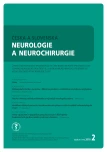-
Medical journals
- Career
Glucose transporter-1 deficiency syndrome – expanding the clinical spectrum of a treatable disorder
Authors: Š. Aulická; K. Česká; H. Ošlejšková
Authors‘ workplace: Klinika dětské neurologie LF MU a FN Brno, Centrum pro epilepsie, Brno
Published in: Cesk Slov Neurol N 2018; 81(2): 171-173
Category: Review Article
doi: https://doi.org/10.14735/amcsnn2018171Overview
Glucose transporter-1 deficiency syndrome (GLUT1DS) is a relatively rare form of treatable epileptic encephalopathy caused by impaired glucose transport across the blood-brain barrier associated with the mutation in the SLC2A1 gene. The disorder has a very variable phenotype. The phenotypic spectrum of GLUT1DS is now known to be a continuum that includes the classic phenotype as well as dystonia 9 and 18, atypical childhood absence epilepsy, myoclonic astatic epilepsy, and paroxysmal non-epileptic abnormalities of movement such as intermittent ataxia, choreoathetosis, dystonia, and alternating hemiplegia. The classic phenotype is characterized by pharmacoresistant infantile-onset seizures, delayed neurologic development, and acquired microcephaly. Non-classical phenotype is characterised by complex movement disorder without epilepsy (hypotonia, spasticity, ataxia and dystonia). Adult form with mild symptoms rarely occurs. In suspicion of GLUT1DS, the lumbar puncture should be provided. The disease hallmark is hypoglycorrhachia in association with normoglycemia. The CSF/ blood glucose ratio is typically less than 0.4. Final confirmation of the diagnosis is the detection of the mutation in the SLC2A1 gene. GLUT1DS is treatable disorder. Ketogenic diet is the treatment of choice. Early diagnosis is crucial, because treatment with the ketogenic diet dramatically improves the symptoms and may also improve the long-term outcome of the patients.
Key words:
GLUT-1 deficiency syndrome – pharmacoresistant epilepsy – SLC2A1 gene – ketogenic diet – spectrum of the phenotype
Sources
1. Vannuci SJ, Maher F, Simpson IA. Glucose transporter protein in brain: delivery of glucose to neurons and glia. Glia 1997; 21(1): 2–21.
2. Tzadok M, Nissenkorn A, Porper K et al. The many faces of Glut1 deficiency syndrome. J Child Neurol 2014; 29(3): 349–359. doi: 10.1177/ 0883073812471718.
3. Pearson T, Pons R, Engelstad K et al. Paroxysmal eye-head movements in GLUT1-deficiency syndrome. Neurology 2017; 88(17): 1666–1673. doi: 10.1212/ WNL.0000000000003867.
4. Mullen SA, Marini C, Suls A et al. Glucose transporter 1 deficiency as a treatable cause of myoclonic astatic epilepsy. Arch Neurol 2011; 68(9): 1152–1155. doi:10.1001/ archneurol.2011.102.
5. Gökben S, Yilmaz S, Klepper J et al. Video/ EEG recording of myoclonic absences in GLUT1 deficiency syndrome with a hot-spot R126C mutation in SLC2A1 gene. Epilepsy Behav 2011; 21(2): 200–202. doi: 10.1016/ j.yebeh.2011.03.027.
6. Lee WG, Klepper J, Verbeek M et al. Glucose transporter-1 deficiency syndrome: expanding clinical and genetic spectrum of a treatable disorder. Brain 2010; 133(3): 655–670. doi: 10.1093/ brain/ awp336.
7. Klepper J. GLUT1 deficiency syndrome in clinical practice. Epilepsy Res 2012; 100(3): 272–277. doi: 10.1016/ j.eplepsyres.2011.02.007.
8. De Giorgis V, Veggiotti P. GLUT1 deficiency syndrome 2013: current state of the art. Seizure 2013; 22(10): 803–811. doi: 10.1016/ j.seizure.2013.07.003.
9. Gras D, Cousin C, Kappeler C et al. a simple blood test expedities the diagnosis of glucose transprter type 1 deficiency syndrome. Ann Neurol 2017; 82(1): 133–138. doi: 10.1002/ ana.24970.
10. Tyrliková I, Klein P. Ketogenní dieta-její účinnost a praktické užití. Neurologia pre prax 2015; 16 (3) 150–152.
Labels
Paediatric neurology Neurosurgery Neurology
Article was published inCzech and Slovak Neurology and Neurosurgery

2018 Issue 2-
All articles in this issue
- Glucose transporter-1 deficiency syndrome – expanding the clinical spectrum of a treatable disorder
- Carpal tunnel syndrome within the context of functional disorders of the musculoskeletal system
- Identification of pediatric patients with pharmacoresistant epilepsy and selection of candidates of non-pharmacological therapy
- Neurofilament light chains in serum and cerebrospinal fluid and status of blood-CSF barrier in the selected neurological diseases
- Physiotherapy in Parkinson’s disease in the Czech Republic – a demographic study
- Patients with idiopathic REM sleep behavior disorder follow-up – phenoconversion into parkinsonian syndrome and dementia
- Czech version of the Edinburgh Cognitive and Behavioral Amyotrophic Lateral Sclerosis Screen – a pilot study
- Acute pediatric myelitis – cohort of 20 patients
- Granular cell tumor in the pituitary stalk
- Brain biopsy in 10 key points – what can a neurologist expect from the neurosurgeon and the neuropathologist?
- Ataxia
- Anticoagulation therapy in patients with atrial fibrillation and cerebral amyloid angiopathy - NO
- Anticoagulation therapy in patients with atrial fibrillation and cerebral amyloid angiopathy
- Anticoagulation therapy in patients with atrial fibrillation and cerebral amyloid angiopathy - YES
- Fabry disease, an overview and the most common neurological manifestations
- Is the role of amyloid in senile dementia substantial?
- Serum anti-Müllerian hormone levels in multiple sclerosis – a multicenter case-control study
- Invasive primary intracerebral infections in women caused by Streptococcus intermedius manifesting as purulent meningitis and intracerebral abscess
- Malignant melanotic schwannoma of the vertebral body in a patient with Carney complex
- Czech and Slovak Neurology and Neurosurgery
- Journal archive
- Current issue
- Online only
- About the journal
Most read in this issue- Ataxia
- Brain biopsy in 10 key points – what can a neurologist expect from the neurosurgeon and the neuropathologist?
- Fabry disease, an overview and the most common neurological manifestations
- Glucose transporter-1 deficiency syndrome – expanding the clinical spectrum of a treatable disorder
Login#ADS_BOTTOM_SCRIPTS#Forgotten passwordEnter the email address that you registered with. We will send you instructions on how to set a new password.
- Career

